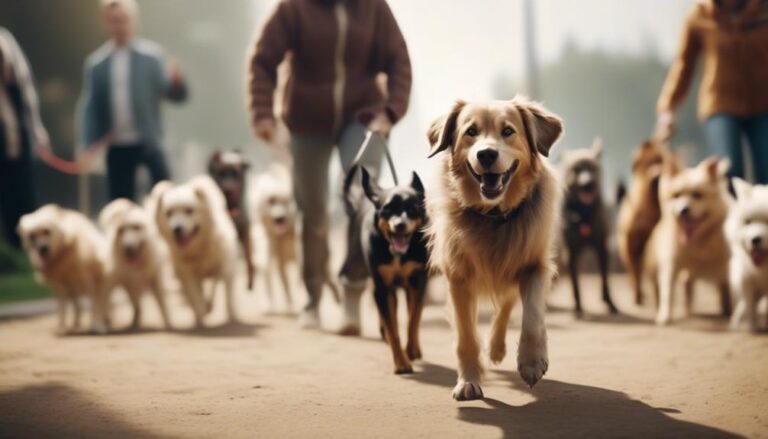The Golden Years Of A Dog

The golden years of a dog’s life, where every tail wag holds a lifetime of memories and every bark is a testament to a life well-lived. As your faithful companion ages, you’ll notice some changes that come along with the wisdom and grace of time. From the physical challenges that may arise to the need for extra care and attention, these golden years are a unique chapter in your dog’s journey.
But fear not, for with a little understanding and the right approach, you can ensure that your furry friend continues to enjoy a fulfilling and joyful life well into their senior years. So, let’s embark on this journey together and discover the secrets to making the golden years truly golden for your beloved companion.
Aging Process
As your beloved dog enters their golden years, it’s important to understand the aging process and how it may affect their health and well-being. Senior dogs experience changes in their bodies and may be more prone to certain health problems. Knowing what to expect can help you provide the best care for your furry friend.
Just like humans, dogs age at different rates depending on their size, breed, and overall health. The American Animal Hospital Association (AAHA) suggests treating a dog as a senior when they are in the last 25 percent of their predicted lifespan. This means that there isn’t a one-size-fits-all age standard for senior dogs. Consulting with your veterinarian is crucial in determining your dog’s predicted lifespan and understanding how the aging process may impact them.
As dogs age, their organ systems may start to decline. They may develop arthritis, have reduced mobility, or experience changes in their vision and hearing. It’s essential to monitor your senior dog’s health closely and address any issues promptly. Regular wellness exams, as recommended by AAHA guidelines, should be conducted every six months for healthy senior pets. These exams allow your veterinarian to catch any potential health problems early on and provide appropriate treatments.
Senior dogs may also be more susceptible to certain health conditions, such as heart disease, kidney disease, and cancer. It’s important to be aware of the signs and symptoms associated with these conditions and seek veterinary care if you notice any changes in your dog’s behavior or health.
Physical Changes
As your dog enters their golden years, you may notice some physical changes taking place. One of the most common changes is a decline in mobility, as their joints may become stiffer and less flexible. Additionally, their vision and hearing may not be as sharp as before, requiring you to provide extra care and support. Lastly, you may observe a decrease in their energy levels, as they may tire more easily and require more rest. Understanding and addressing these physical changes can help ensure your senior dog’s comfort and well-being throughout their golden years.
Aging and Mobility
As your senior dog ages, you may notice changes in their physical mobility. They may become less active and experience joint stiffness, making it harder for them to move around. It’s important to address these mobility issues to ensure your furry friend’s comfort and well-being. One way to support your dog’s joint health is by providing them with joint supplements that contain ingredients like glucosamine and chondroitin. These supplements can help alleviate joint stiffness and improve mobility.
Additionally, incorporating low-impact exercises like walking and gentle stretching into your dog’s routine can help maintain their mobility. Regular veterinary check-ups are crucial for early detection and management of mobility issues such as arthritis. By making environmental adaptations, such as using non-slip mats and raised food/water bowls, you can also ensure your senior dog’s safety and make their daily movements easier.
Vision and Hearing
If your senior dog is experiencing changes in their physical mobility, it’s important to also consider the potential impact on their vision and hearing. As dogs age, it is common for them to develop vision loss and hearing impairments. Regular cleaning of their ears, using prescribed eye drops or ointments, and scheduling regular eye examinations can help maintain their ear and eye health.
Protecting them from excessive sun exposure and loud noises, as well as avoiding excessive ear cleaning, can prevent further vision and hearing loss. Maintaining a healthy weight and providing regular exercise is crucial for their overall well-being, especially considering potential impairments in their vision and hearing. Additionally, making environmental adaptations such as using non-slip mats, ensuring adequate lighting, and providing raised food and water bowls can help accommodate their changing needs.
Energy Levels Decrease
With age, your dog’s energy levels naturally decrease, resulting in reduced physical activity and stamina. It’s important to understand that this is a normal part of the aging process for pets. As your dog gets older, you may notice that they aren’t as eager to play or go for long walks as they used to be. They may tire more easily and require shorter and less strenuous exercise sessions. It’s essential to adjust their exercise routine to accommodate their changing energy levels.
Additionally, their diet and nutrition may need to be modified to support their lower energy requirements. Providing mental stimulation through interactive toys and gentle exercise can help maintain their overall well-being despite the decrease in energy levels. Regular veterinary check-ups are crucial to monitor and address any physical changes associated with decreased energy levels in senior dogs. Remember, as your dog ages, their energy levels may decrease, but with your love and care, they can still enjoy their golden years to the fullest.
Cognitive Function
Regular mental exercise and stimulation are key to supporting cognitive function in senior dogs. Just like humans, older dogs can experience cognitive dysfunction, which can affect their memory, learning, and overall cognitive abilities. Providing interactive toys, games, and new experiences can help maintain cognitive health in senior dogs. Engaging their senses and challenging their minds with puzzles and problem-solving activities can help keep their brains sharp. Additionally, incorporating omega-3 fatty acids into their diet can support brain health and cognitive function in aging dogs. These essential fatty acids have been shown to have positive effects on brain function and can potentially slow cognitive decline in older dogs.
Socialization and regular interaction with humans and other pets are also important for preventing cognitive decline in senior dogs. Regular social engagement can help stimulate their minds and prevent feelings of isolation or boredom. This can be achieved through playdates with other dogs, visits to dog parks, or even joining dog-friendly community events. Not only does socialization provide mental stimulation, but it also promotes overall well-being and happiness in older dogs.
As your dog enters their senior years, it is crucial to monitor for signs of cognitive decline or confusion. If you notice any changes in their behavior, memory, or overall cognitive abilities, it is important to seek veterinary guidance. Your veterinarian can assess your dog’s cognitive function and provide guidance on potential treatment options or management strategies.
Taking proactive steps to support your senior dog’s cognitive function can greatly enhance their quality of life during their golden years. By providing regular mental exercise, stimulation, and socialization, you can help keep their minds sharp and promote their overall well-being.
Nutritional Needs
As your dog enters their senior years, it is crucial to understand and address their changing nutritional needs. Just like humans, dogs’ bodies change as they age, and their digestive system is no exception. This can affect their nutrient and calorie requirements, making it important to adjust their diet accordingly.
To keep your senior dog healthy and happy during their golden years, it’s essential to provide them with a balanced diet that meets their changing needs. Look for diets that are specifically marketed for senior dogs, as they are formulated to provide the necessary nutrients. When evaluating these diets, be sure to read the labels to assess the calorie and nutrient densities.
A high-quality protein source should be a priority in your senior dog’s diet. Protein helps to maintain muscle mass and supports overall health. Additionally, omega-3 fatty acids are beneficial for joint health, which can be a common concern in older dogs. Including these nutrients in their diet can help alleviate any discomfort or stiffness they may experience.
Obesity can also become a concern in senior dogs, as their activity levels tend to decrease. To prevent weight gain, it’s important to reduce their calorie intake while still ensuring they receive adequate nutrition. This can be achieved by feeding them smaller, more frequent meals and choosing lower-calorie options.
Furthermore, increasing fiber in their diet can promote digestive health and prevent constipation, which can be more common in older dogs. Consult with your veterinarian to determine the appropriate fiber level for your senior dog’s specific needs.
Lastly, regular veterinary check-ups are crucial for monitoring your dog’s nutritional needs. As they age, their dietary requirements may change, and adjustments may need to be made. Your veterinarian can provide guidance and recommend specialized diets or dental treats if necessary.
Exercise and Mobility
To ensure the well-being of your senior dog, it’s crucial to prioritize their exercise and mobility needs. Just because your furry friend is getting older doesn’t mean they should skip out on their daily exercise routine. In fact, older dogs still require regular physical activity to keep their muscles strong, their joints flexible, and their minds sharp.
When it comes to exercise, aim for at least 30 minutes a day. However, be mindful of your dog’s changing mobility and energy levels. If long walks or intense play sessions are no longer feasible, consider breaking up exercise sessions into shorter durations throughout the day. Low-impact exercises like walking or gentle stretching can help maintain muscle tone without putting too much strain on the joints.
In addition to physical exercise, mental stimulation is also essential for your older dog. Providing interactive toys and puzzles can keep their minds engaged and sharp. Short training sessions can also be beneficial, not only for mental stimulation but also for reinforcing good behavior.
For joint-friendly exercise options, consider swimming or hydrotherapy. These activities can provide a low-impact workout while also relieving any discomfort or pain your dog may be experiencing. Additionally, regular playdates with other dogs can provide socialization opportunities and keep your furry companion active and engaged.
Lastly, don’t forget the importance of regular veterinary check-ups. These visits can help detect early signs of arthritis or other mobility issues. Your vet may be able to recommend joint supplements, physical therapy, or even acupuncture to manage any pain or discomfort your older dog may be experiencing.
Dental Care
Now that you’ve reached the subtopic of Dental Care in your dog’s golden years, it’s crucial to prioritize brushing their teeth regularly. This simple yet effective practice can help prevent periodontal disease and maintain their oral health. Additionally, consider providing dental treats or toys to further promote healthy teeth and gums. Remember to schedule regular check-ups with your vet to ensure your senior dog’s dental care needs are met.
Brushing Dog’s Teeth
Regularly brushing your dog’s teeth is an essential part of their dental care routine, helping to prevent periodontal disease and maintain optimal oral health. Just like humans, dogs can develop dental disease, which can lead to pain, infection, and other serious health issues. As your dog gets older, their risk of dental problems increases, making regular brushing even more important. By brushing your dog’s teeth, you can remove plaque and tartar buildup, reducing the risk of dental disease.
It’s recommended to start dental care early, ideally by the age of three, and to continue throughout their life. Along with brushing, you can also use dental chews or toys to promote oral health. Remember to inspect your teeth regularly and consult with your vet for professional dental cleanings as needed. Taking care of your dog’s teeth will ensure they can enjoy their golden years pain-free and happy, ready to play at the dog park.
Dental Treats for Dogs
Are you looking for a tasty and effective way to maintain your dog’s dental health? As pets age, dental care becomes increasingly important. By the age of 3, regular dental cleanings and exams should ideally begin. However, some dogs, especially small breeds prone to dental disease, may require more frequent cleanings. While brushing your dog’s teeth regularly is crucial for preventing periodontal disease, dental treats can also play a significant role in promoting oral health. These treats are designed to help remove plaque and tartar buildup, reducing the risk of dental issues.
Additionally, specialized diets or dental treats formulated for senior dogs can provide extra support for aging teeth and gums. By incorporating dental treats into your dog’s routine, you can help ensure their dental health remains in tip-top shape.
Regular Vet Check-Ups
As your dog ages, ensuring their dental health remains in top condition becomes increasingly important, which is why regular vet check-ups are essential for maintaining their oral well-being. Just like humans, senior pets are prone to dental issues such as periodontal disease, which can lead to pain, infection, and even tooth loss. Regular dental check-ups, recommended at least annually starting as early as age 3, allow your vet to assess your dog’s dental health and provide necessary treatments.
They can also monitor for signs of joint or bone disease, which are common in older dogs and can affect their ability to eat and chew properly. By staying proactive with regular vet check-ups, you can help ensure that your furry companion enjoys their golden years with a healthy and pain-free smile.
Grooming and Skin Care
Maintaining healthy skin, hair, and nails is crucial for your senior pet, as regular grooming provides the opportunity to detect any abnormalities and ensure their comfort and well-being. As our furry friends enter their golden years, their grooming needs may change. Senior pets are more likely to develop matted fur due to decreased activity, and their skin becomes more sensitive and prone to dryness. By spending time grooming your senior pet, you can keep them comfortable and healthy.
Grooming not only helps maintain your pet’s physical appearance but also serves as a bonding experience. As you gently brush their fur, you can check for any lumps, bumps, or skin irritations. Early detection of these abnormalities is crucial for prompt veterinary attention, which can prevent potential health issues from escalating. Additionally, regular grooming helps prevent matting, which can lead to discomfort and even skin infections.
When it comes to senior pets, it’s important to approach grooming with care and patience. Their joints may be stiffer, making it more challenging for them to stand or move around. Choose a grooming area that is comfortable and non-slippery, ensuring their safety during the process. Use soft brushes and combs that won’t irritate their skin, and be mindful of any sensitive areas they may have.
In addition to regular brushing, consider incorporating other grooming practices such as nail trimming and dental care into your senior pet’s routine. Overgrown nails can cause pain and difficulty walking, while dental issues can contribute to other health problems. By addressing these aspects of grooming, you can ensure your pet’s overall well-being during their golden years.
Joint Health
Taking care of your senior dog’s joint health is crucial for their comfort and overall well-being. As dogs age, their joints can become stiff, achy, and prone to conditions like arthritis. To ensure your furry friend stays mobile and pain-free, there are several steps you can take.
One way to support your dog’s joint health is by incorporating joint supplements into their diet. Supplements containing glucosamine and chondroitin have been shown to promote joint health and reduce inflammation. These can be easily added to your dog’s meals and may help alleviate discomfort.
Regular exercise is also essential for maintaining your dog’s joint health. While high-impact activities should be avoided, low-impact exercises like walking and gentle stretching can help keep their joints mobile and flexible. Regular exercise not only benefits their joint health but also contributes to their overall health and well-being.
Providing your senior dog with orthopedic beds or supportive surfaces for resting is another way to ease joint discomfort. These beds offer extra cushioning and support, relieving pressure on their joints and promoting better sleep.
Regular veterinary check-ups are crucial for early detection and management of joint issues in senior dogs. Your vet can assess your dog’s joint health, recommend appropriate treatments, and provide guidance on managing any existing conditions.
In some cases, additional therapies such as physical therapy or acupuncture may be beneficial for managing joint pain. These alternative treatments can help reduce inflammation, increase blood flow to the affected areas, and provide pain relief.
Mental Stimulation
To keep your senior dog’s mind sharp and active, it is important to provide them with regular mental stimulation. Just like humans, dogs can experience cognitive decline as they age, but engaging their minds can help keep them mentally fit and delay the onset of cognitive dysfunction. There are several ways you can provide mental stimulation for your senior dog.
One effective method is to engage in daily exercise. This not only helps maintain muscle tone and adapt to changing mobility and energy levels but also provides mental stimulation. Taking your dog for walks in different environments can expose them to new sights, sounds, and smells, which can keep their brain engaged and curious.
Interactive toys and puzzles are another great way to provide mental stimulation. These toys require your dog to problem-solve and use their cognitive skills to obtain a reward. You can find a variety of interactive toys designed specifically for senior dogs, such as treat-dispensing toys or puzzle games that require them to figure out how to access hidden treats.
Incorporating short training sessions into your dog’s routine can also help keep their mind sharp. You can teach them new tricks, practice obedience commands, or even engage in scent work activities to keep their brain active and engaged.
Additionally, arranging regular playdates with other dogs can promote socialization and mental engagement. Dogs are social animals, and interacting with other canines can provide mental stimulation and keep their minds sharp.
Veterinary Care
Now that your dog is entering their golden years, it’s important to prioritize their veterinary care to ensure their health and well-being. Preventive healthcare measures, such as regular check-ups and vaccinations, are crucial in detecting and addressing any issues before they become serious. Additionally, senior dog nutrition and managing chronic conditions play a significant role in keeping your furry friends happy and comfortable as they age. Remember, a proactive approach to veterinary care can make all the difference in ensuring your dog’s golden years are filled with love and good health.
Preventive Healthcare Measures
Regular veterinary check-ups are essential for senior dogs, as they allow for monitoring of their health and early detection of any potential issues. These preventive healthcare measures are crucial in ensuring that your furry friend enjoys their golden years to the fullest. As dogs age, their nutritional needs change, and specialized diets and supplements can help support their joint and digestive health. Joint supplements, in particular, can help maintain mobility and ease any discomfort caused by arthritis.
In addition to a balanced diet, dental care is vital for senior dogs to prevent periodontal disease, which can have a significant impact on their overall health. Regular cleanings and teeth brushing can help keep their teeth and gums healthy. By incorporating these preventive healthcare measures into your senior dog’s routine, you can help them stay happy and healthy for many years to come.
Senior Dog Nutrition
As your senior dog enters their golden years, ensuring proper veterinary care for their nutrition is crucial for their overall health and well-being. Senior dogs have changing nutrient and calorie needs, and feeding them the right diet is essential. Look for dog food specifically marketed for seniors, as these diets are formulated with balanced nutrients, high-quality protein, omega-3 fatty acids, reduced calories, and increased fiber. A well-balanced diet can help prevent weight gain and maintain muscle mass. It’s also important to be aware that senior dogs are more prone to developing heart disease.
Choosing a dog food that is low in sodium and high in omega-3 fatty acids can support heart health. Regular visits to the veterinarian can ensure that your senior dog’s nutritional needs are being met and help identify any potential health issues early on. By providing the right nutrition, you can help your senior dog enjoy their golden years to the fullest.
Managing Chronic Conditions
To effectively manage chronic conditions in your senior dog, it is essential to prioritize regular veterinary examinations for early detection and personalized treatment plans. As part of the Golden Years of your dog, managing chronic conditions is crucial for their overall well-being and quality of life. Discuss with your vet about specific chronic conditions like arthritis, diabetes, or heart disease, and work together to develop a comprehensive plan tailored to your dog’s needs.
Consistent medication administration and follow-up appointments are vital in ensuring the effectiveness of the treatment plan. Monitoring your senior dog’s weight, appetite, and behavior can provide important insights into the progression of chronic conditions. Additionally, environmental modifications and lifestyle adjustments may be necessary to accommodate their specific needs. With proper veterinary care and attention, you can help your senior dog navigate their golden years with comfort and happiness.
Comfort and Quality of Life
Ensuring the comfort and quality of life for your senior dog is essential for their well-being and happiness. As your dog enters their golden years, it’s important to make some adjustments to their care routine to ensure they are living their best life. Here are some key aspects to consider when it comes to providing comfort and quality of life for your senior dog.
First and foremost, regular preventive veterinary care is crucial. Schedule wellness exams every six months and annual lab work to catch any potential health issues early on. This can help maintain your dog’s overall health and detect any age-related conditions that may arise.
The diet also plays a significant role in your senior dog’s comfort and quality of life. Adjust their diet to meet their changing nutrient and calorie needs. Look for balanced high-quality protein sources and consider incorporating omega-3 fatty acids to support their overall well-being.
Don’t overlook your senior dog’s dental health. Regular dental cleanings, teeth brushing, and the use of dental chews or toys can help prevent dental issues and keep their mouth healthy and pain-free.
Joint health and mobility are crucial for your senior dog’s comfort. Consider supplements that support joint health, engage in low-impact exercises to keep them active, and provide them with an orthopedic bed for added comfort. Regular veterinary check-ups can help monitor and manage any joint-related issues.
Physical exercise is important, but mental stimulation is equally vital for your senior dog. Provide them with interactive toys, engage in short training sessions, and ensure regular interaction to support their cognitive health and overall happiness.
The Golden Years Of A Dog Frequently Asked Questions:
What Age Is Your Golden Years?
Your golden years begin when you retire, typically around age 65. It’s important to prioritize your health concerns by staying active with exercise routines tailored to your needs. Take care of yourself!
What Age Is a Golden Retriever a Senior Dog?
When it comes to golden retrievers, they are considered senior dogs when they reach the last 25% of their predicted lifespan. Common health issues can include arthritis, cancer, and cognitive decline. To care for your senior golden retriever, make sure to provide regular veterinary care, adjust their diet, and provide a supportive and enriching environment.
What Is Considered Old in Dog Years?
As dogs age, their bodies go through changes just like humans. In dog years, a dog is considered old when they reach around 7 years old. Signs of aging in dogs include gray hair, decreased energy, and joint stiffness. It’s important to provide senior dog care by adjusting their diet, and exercise routine, and providing regular vet check-ups.
Do Senior Dogs Eat Less as They Age?
As senior dogs age, their nutritional needs may change, leading to a decrease in appetite. It’s important to address their health concerns, adjust their diet accordingly, and ensure they still get the exercise they need.
Conclusion
In conclusion, as your beloved dog enters their golden years, it is essential to prioritize their health and well-being. Regular veterinary check-ups, proper nutrition, exercise, and mental stimulation are crucial for maintaining their comfort and quality of life. By understanding and addressing the physical and cognitive changes that come with aging, you can ensure that your senior dog enjoys their twilight years to the fullest. Remember, with compassionate care and support, your faithful companion can continue to bring joy and companionship for years to come.








